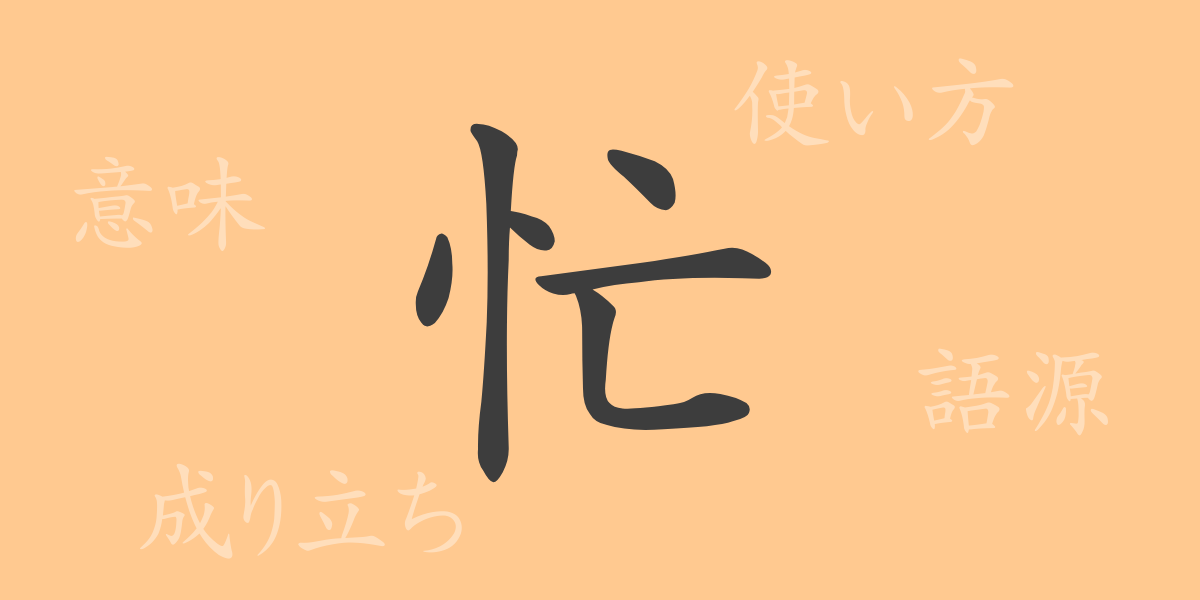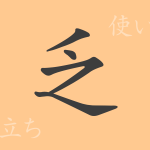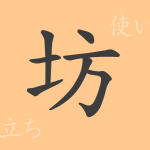In Japanese society, being busy is often considered a virtue. However, few people may deeply understand the history and meaning of the character “忙” (ぼう, bou). In this article, we spotlight the commonly used kanji “忙” (ぼう, bou), exploring its origins, modern usage, and even the idioms and proverbs it appears in, to uncover the full story behind this character.
Origins of 忙 (ぼう, bou)
The kanji “忙” (ぼう, bou) has its origins in ancient China. This character is a combination of the radical “忄” (りっしんべん, risshinben), which represents the heart, and the character “亡” (ない, nai), which means “to escape” or “to lose.” “亡” (ない, nai) originally signified “to flee” or “to lose,” and “忙” (ぼう, bou) depicts a state where the heart is lost or distracted. Thus, “忙” (ぼう, bou) has been used since ancient times to signify a state where the heart is directed elsewhere and unable to focus.
Meaning and Usage of 忙 (ぼう, bou)
In modern Japanese, the adjective “忙しい” (いそがしい, isogashii) primarily refers to a state where one has many tasks or duties and lacks time or is unable to take a break. It can also express a lack of mental space. In the business scene, it is a frequently used word, and extreme busyness can be seen as a status symbol. However, there is also a growing movement that emphasizes work-life balance.
Reading, Stroke Count, and Radical of 忙 (ぼう, bou)
The kanji “忙” (ぼう, bou) has several readings in Japanese.
- Readings: The on’yomi (音読み) is “ボウ” (ぼう, bou), and the kun’yomi (訓読み) is “いそがしい” (isogashii) and “せわしい” (sewashii).
- Stroke count: “忙” (ぼう, bou) has a total of 7 strokes.
- Radical: The radical is “忄” (りっしんべん, risshinben), which indicates matters related to the heart.
Idioms, Proverbs, and Phrases Using 忙 (ぼう, bou)
There are many idioms, proverbs, and phrases in Japanese that include the character “忙” (ぼう, bou). Here are a few examples:
- 多忙 (たぼう, tabou): Great busyness. A state where one has a lot of work or tasks.
- 忙中閑あり (ぼうちゅうかんあり, bouchuukanari): A proverb meaning that no matter how busy one is, there is always a little time for rest or relaxation.
- 忙中に閑なし (ぼうちゅうにかんなし, bouchuunikannashi): A state where one is constantly busy and has no time to rest at all.
- 忙殺 (ぼうさつ, bousatsu): A state of being so busy that one feels overwhelmed, as if being “killed” by busyness.
Summary of 忙 (ぼう, bou)
The kanji “忙” (ぼう, bou) has been used to symbolize busyness and a distracted heart from its formation to the present day. In modern society, while a busy life is sometimes praised, there is also a growing call for mental space and balance. Through this kanji, we might find an opportunity to re-examine our lives and work styles. Understanding the meanings embedded in each character is also a journey to rediscover the richness of the Japanese language.

























